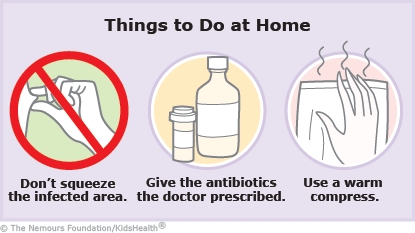Mastitis is inflammation (soreness and swelling) of the breast caused by an infection. The breast is usually painful, red, warm, and swollen. The lymph nodes under the arm may swell, and there may be discharge from the nipple.
Mastitis is treated with antibiotics. Sometimes the health care provider removes the infected fluid from the breast area with a needle.
Here's how to care for your child while the infection heals.



Your child:

Your child:

What causes mastitis? It happens when bacteria (a type of germ) that normally lives on the skin or in the nose/mouth gets into the breast (usually through the nipple) and causes an infection. Mastitis usually affects only one breast.
What makes mastitis more likely to happen in kids and teens? It's more likely to happen:
Can mastitis cause long-term problems? Most kids and teens recover completely from mastitis with no lasting problems.